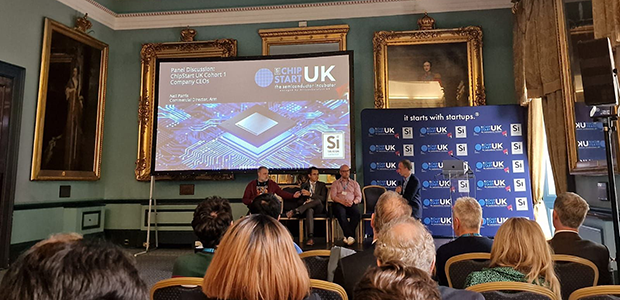
Arm leads panel discussion with startup CEOs
At a recent ChipStart UK Showcase event, Startups Magazine sat down to hear Neil Parris, Commercial Director, Arm speak with Cohort 1 CEOs.
The ChipStart programme is a UK initiative designed to support and accelerate the growth of startups in the semiconductor industry. It provides early-stage companies with access to critical resources, expertise, and opportunities to develop their innovative semiconductor technologies.
Key components of the ChipStart programme include:
- Mentorship: access to industry experts and experienced entrepreneurs who offer guidance on technical, business, and strategic challenges
- Funding: opportunities to secure investment from venture capitalists and other funding sources to support research and development
- Infrastructure: provision of essential tools, software, and hardware required for the design, testing, and production of semiconductor devices
- Networking: connecting startups with potential partners, customers, and suppliers within the semiconductor ecosystem
- Training: offering workshops and training sessions on various aspects of semiconductor technology, business development, and market strategies.
- Market access: helping startups to navigate the semiconductor market, including assistance with regulatory compliance and go-to-market strategies
The programme aims to foster innovation, reduce the barriers to entry in the semiconductor industry, and ultimately drive technological advancements by empowering new companies to succeed in a competitive market.
Mark Rushworth, CEO, Finchetto, Rodolfo Rosini, CEO, Vaire Computing, and Dorian Haci, CEO, MintNeuro each shared their experience of being a part of the programme.
“I’ve come along as somewhat of an interloper, as we’re a photonics company. Actually, we’re trying to get rid of electronics from the system,” notes Rushworth. “But actually, what that has meant is that we’ve been able to engage the semiconductor industry specifically on photonics. We’ve been able to get more visibility and credibility with what is quite a radical solution. But there’s also the access to the expertise … being able to interface with that community at any stage was really very valuable.”
“I’m coming from an academic background, so to go through this learning curve of understanding more about this industry and getting started has been instrumental,” said Haci. “The mentorship has been extremely helpful for us defining our go-to-market strategy and also in understanding who we actually are.”
“Having a network there permanently was so transformative,” echoes Rosini.
Arm was the first to join Silicon Catalyst’s ecosystem as both a strategic and in-kind member back in 2020. The partnership connects Silicon Catalyst’s leading incubator and accelerator dedicated to silicon startups, with Arm Flexible Access for Startups, an offering which provides startups with $0 access to a wide range of Arm IP, tools, and support, helping them to get to market faster, using industry proven IP, and the benefit of the Arm ecosystem. Silicon Catalyst is an important part of this ecosystem, bringing other in-kind partners, and access to advisors and investors.
“The UK semiconductor strategy builds on the strengths that the UK technology industry already has and looks to drive global industry collaboration with other like-minded nations to ensure supply chain resilience for this vitally important sector. Arm’s leadership in advanced processor design and software platforms is a major part of the UK’s great strength in semiconductor design, and we are fully committed to the UK as one of its main design centres going forward. Arm’s goal is to continue to deliver the foundational platforms to our global partners for the future of computing, and the ongoing investment in talent and innovation that the UK semiconductor strategy promotes aligns with this vision,” Richard Grisenthwaite, EVP, and Chief Architect at Arm told Electronic Specifier.
The panel ended by offering their advice for the next cohort of startups:
- Utilise opportunities: founders should take full advantage of the resources and opportunities provided by the programme, including the expertise of mentors and industry experts
- Set clear objectives: it is important to have a clear understanding of what you want to achieve by the end of the programme. Regularly review and challenge these objectives with the programme team to ensure they are met
- Time management: carve out dedicated time to achieve your objectives, treating them as top priorities
- Networking and team building: make the most of networking opportunities and involve more team members to build stronger relationships and gain broader insights
- Early market engagement: start market discussions and engage with potential partners early on to streamline processes like setting up software and other critical operations
- Plan ahead: think in advance about what you want to get out of the programme and create a detailed plan to achieve those goals
- Leverage ecosystem: take advantage of the ecosystem and partnerships offered by the programme rather than trying to do everything independently
- Future development: consider future development and potential partnerships for expanding your technology and product offerings

